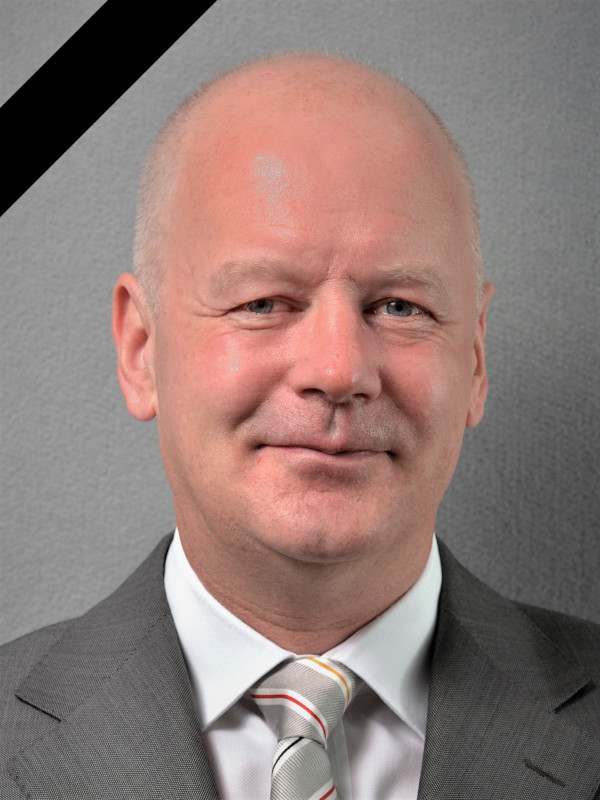Press Releases
Saddened by Death of Martin C.N. WRIGHT
We are truly saddened and shocked that our highly valued colleague
Martin C.N. Wright
suddenly passed away on 17 January 2023 unexpectedly and far too early. After almost 3 decades of dedication and loyalty to ETW, he leaves a large emptiness behind.
Martin’s comprehensive experience and knowledge on general wind tunnel testing and strong understanding of high Reynolds number testing in particular, made him a well-known authority in the global ground testing community. He joined ETW in 1994, developed fundamental cryogenic testing methods and strategies and played a key role in establishing and serving our international user base. He significantly contributed to ETW’s outstanding capabilities and renowned reputation. For many of our users, Martin has been the principal point of expertise and the main face at ETW.
With his passionate, kind and supportive nature, Martin was a great inspiration to all of his colleagues at ETW and beyond. There were not any questions about cryogenic testing, that he was not prepared to solve or ready to answer. Martin was always there to assist his colleagues and our users in a friendly and reliable manner, plus he always kept what he had promised. Beyond the technical aspects, Martin highly valued the intercultural interaction associated to ETW and was curious about the unknown.
Martin was instrumental in shaping ETW to its current status quo. He has left us a truly valuable treasure, therefore we shall do our utmost to build upon his contributions and continue to develop ETW with the consistency and commitment that Martin did.
Martin will be dearly missed by all of his colleagues at ETW and he will remain in our hearts forever.
Our thoughts are with Martin’s family and friends and we would like to wish them strength in these difficult times.

If you would like to send your condolences to Martin’s family, here at ETW we are preparing an A4 book of remembrance. Please feel free to send your contributions (letters, photos, messages) to
Sophia Hoffmann (E-Mail: ), ETW GmbH, Ernst-Mach-Strasse, 51147 Köln, Germany.
Some of us find a little comfort in this poem Death Is Nothing At All
by Henry Scott-Holland.
Death is nothing at all.
It does not count.
I have only slipped away into the next room.
Nothing has happened.
Everything remains exactly as it was.
I am I, and you are you,
and the old life that we lived so fondly together is untouched, unchanged.
Whatever we were to each other, that we are still.
Call me by the old familiar name.
Speak of me in the easy way which you always used.
Put no difference into your tone.
Wear no forced air of solemnity or sorrow.
Laugh as we always laughed at the little jokes that we enjoyed together.
Play, smile, think of me, pray for me.
Let my name be ever the household word that it always was.
Let it be spoken without an effort, without the ghost of a shadow upon it.
Life means all that it ever meant.
It is the same as it ever was.
There is absolute and unbroken continuity.
What is this death but a negligible accident?
Why should I be out of mind because I am out of sight?
I am but waiting for you, for an interval,
somewhere very near,
just round the corner.
All is well.
Nothing is hurt; nothing is lost.
One brief moment and all will be as it was before.
How we shall laugh at the trouble of parting when we meet again!
Background
ETW - Pushes the Limits
Wind tunnels, using scaled down aircraft models, are the major source of aerodynamic design data for new aircraft projects. Wind tunnels are indispensable tools for aerodynamic research and aircraft development; they complement and validate flow simulation methods on the most powerful computers.
ETW, the European Transonic Wind Tunnel, was designed and constructed by the four European countries France, Germany, United Kingdom and The Netherlands. It is operated based on a non-profit policy by the ETW GmbH, founded in 1988. Its location in Cologne, Germany, is right in the middle of Europe.
European researchers and engineers harness ETW’s capabilities for advancing aeronautical science into aircraft innovation by accessing real-flight conditions in this cutting edge ground-test laboratory.
ETW is the worldwide leading wind tunnel for testing aircraft at real flight conditions. Aircraft performance and their flight envelope limits can be accurately determined with unique quality at ETW long before flight testing of a first prototype. This enables significant reductions in the technical and economic risks associated with the development of new aircraft. Manufacturers from all over the world take advantage of the exceptional features of this high-tech facility enhancing the performance, economic viability, and environmental friendliness of their future aircraft.
ETW – Erweitert Horizonte
Aerodynamische Entwurfsdaten für neue Flugzeugprojekte werden zu einem großen Teil aus Windkanaluntersuchungen an maßstäblich verkleinerten Flugzeugmodellen gewonnen. Windkanäle sind unverzichtbare Werkzeuge sowohl für die Strömungsforschung als auch für die Flugzeugentwicklung; sie ergänzen und validieren Verfahren zur Strömungssimulation auf modernsten Hochleistungsrechnern.
Der Europäische Transschall-Windkanal ETW ist eine transnationale Forschungseinrichtung in Köln. Er wurde von den vier Staaten Frankreich, Deutschland, Großbritannien und den Niederlanden entwickelt und gebaut. Betrieben wird er von der ETW GmbH, die als eigenständiges Non-Profit-Unternehmen 1988 gegründet wurde.
Der ETW erlaubt europäischen Forschenden und Ingenieur:innen, tatsächliche Flugzustände unter Laborbedingungen am Boden darzustellen, um wissenschaftliche Erkenntnisse zu erarbeiten und in Luftfahrtinnovationen zu überführen.
Der ETW ist der weltweit führende Windkanal, in dem Luftfahrzeuge unter wirklichkeitsgetreuen Flugbedingungen getestet werden können. Lange bevor der erste Prototyp für einen Flugtest zur Verfügung steht, können im ETW die Leistungsfähigkeit und die Flugbereichsgrenzen eines Neuentwurfs genauestens und mit einzigartiger Qualität bestimmt werden. Dies reduziert erheblich die technischen und wirtschaftlichen Risiken, die mit der Entwicklung neuer Luftfahrzeuge verbunden sind. Hersteller aus aller Welt nutzen die außergewöhnlichen Möglichkeiten dieser Hightech-Einrichtung, um die Leistungsfähigkeit, die Wirtschaftlichkeit und die Umweltfreundlichkeit ihrer zukünftigen Produkte nachhaltig zu verbessern.


